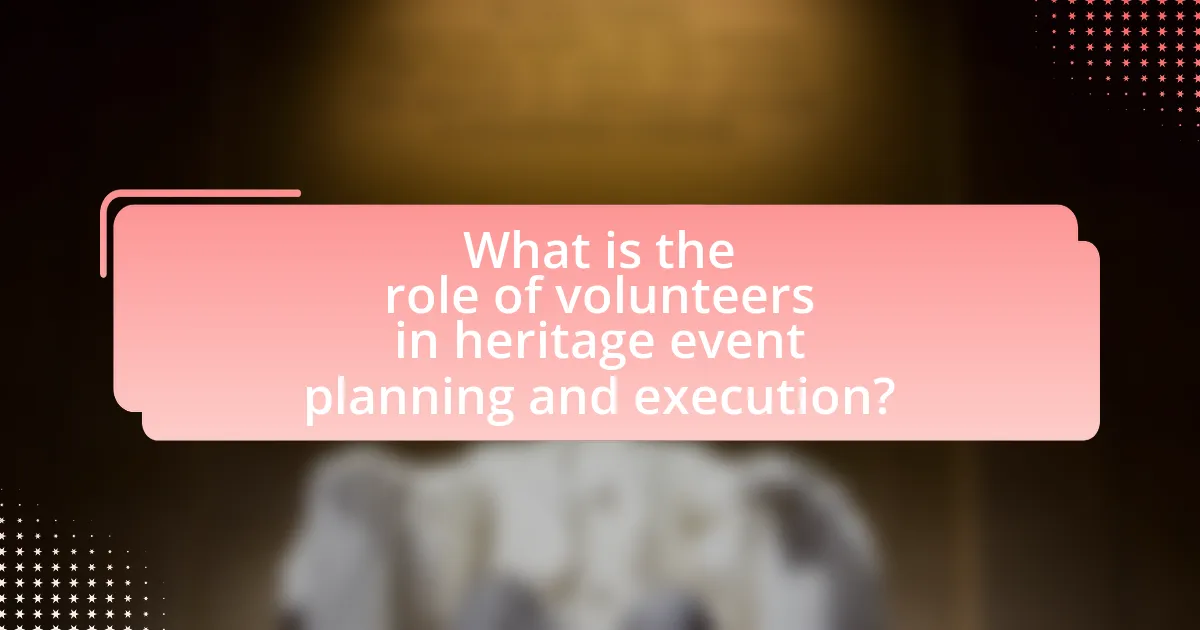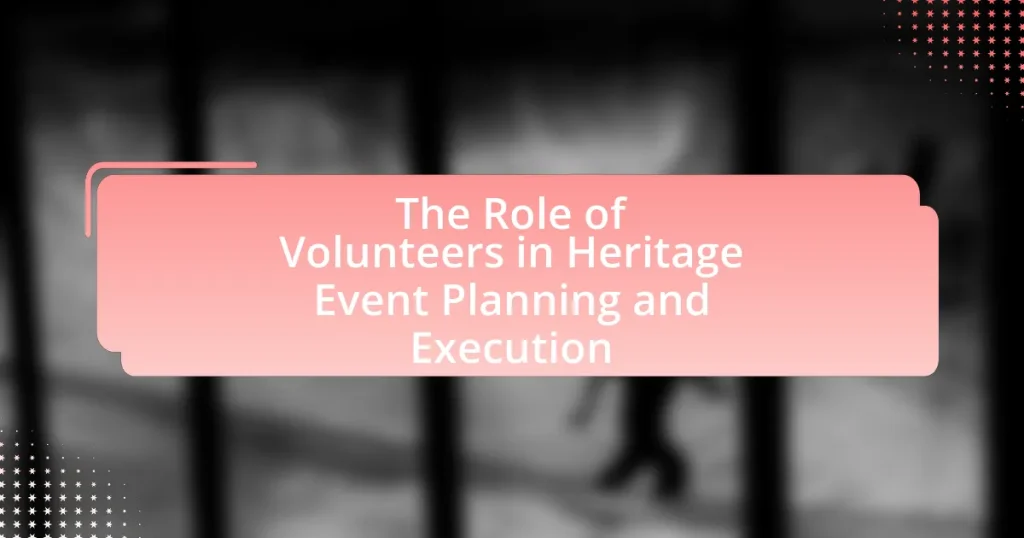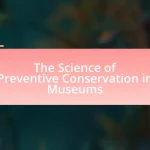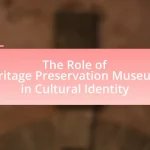The article focuses on the critical role of volunteers in the planning and execution of heritage events. It highlights how volunteers contribute to various operational aspects, enhance community engagement, and improve visitor experiences through their diverse skills and local knowledge. Key topics include the specific tasks performed by volunteers, their impact on event success, the importance of effective communication and organizational skills, and strategies for recruiting and training volunteers. Additionally, the article addresses common misconceptions about volunteer roles and emphasizes best practices for integrating volunteers into heritage events to maximize their contributions and ensure successful outcomes.

What is the role of volunteers in heritage event planning and execution?
Volunteers play a crucial role in heritage event planning and execution by providing essential support in various capacities, including organization, logistics, and community engagement. Their involvement enhances the event’s reach and effectiveness, as they often bring local knowledge and enthusiasm that enrich the experience for attendees. For instance, a study by the National Park Service found that volunteer participation can increase visitor satisfaction and foster a sense of community ownership over heritage events. This demonstrates that volunteers not only assist in operational tasks but also contribute to the cultural significance and success of heritage events.
How do volunteers contribute to the success of heritage events?
Volunteers significantly enhance the success of heritage events by providing essential support in various operational areas. They assist in planning, organizing, and executing events, which helps to reduce costs and increase community engagement. For instance, a study by the National Council for Voluntary Organizations found that volunteer involvement can lead to a 30% increase in event attendance, demonstrating their impact on community participation. Additionally, volunteers often bring diverse skills and local knowledge, which enriches the event experience and fosters a sense of ownership among community members. Their contributions are vital for creating a welcoming atmosphere, ensuring smooth logistics, and facilitating educational activities, all of which are crucial for the overall success of heritage events.
What specific tasks do volunteers perform during heritage events?
Volunteers perform various specific tasks during heritage events, including assisting with event setup and breakdown, guiding attendees, providing information about the heritage site, managing registration, and facilitating activities. These tasks are essential for ensuring the smooth operation of the event and enhancing the visitor experience. For instance, volunteers often help set up displays and seating arrangements, which contributes to the overall organization of the event. Additionally, by guiding attendees and sharing knowledge about the heritage site, volunteers play a crucial role in educating the public and fostering appreciation for cultural heritage.
How do volunteers enhance the overall experience for attendees?
Volunteers enhance the overall experience for attendees by providing personalized assistance and fostering a welcoming atmosphere. Their presence allows for improved attendee engagement, as volunteers often serve as guides, answering questions and offering insights about the event. Research indicates that events with active volunteer participation report higher satisfaction rates among attendees, with a study by the National Conference on Volunteering and Service showing that 85% of participants felt more connected to the event due to volunteer interactions. This connection not only enriches the attendee experience but also promotes a sense of community and belonging, which is crucial in heritage event settings.
Why are volunteers essential in heritage event planning?
Volunteers are essential in heritage event planning because they provide critical manpower and diverse skills that enhance the event’s success. Their involvement allows for a broader range of activities and services, from logistical support to community engagement, which are vital for creating a rich and immersive experience. Research indicates that events with volunteer participation often see increased attendance and community support, as volunteers help foster a sense of ownership and pride in the heritage being celebrated. For instance, a study by the National Park Service found that volunteer-led initiatives can improve visitor satisfaction and engagement by up to 30%, demonstrating the tangible impact of volunteer contributions in heritage events.
What are the benefits of involving volunteers in the planning process?
Involving volunteers in the planning process enhances community engagement and resource efficiency. Volunteers bring diverse perspectives and skills, which can lead to innovative ideas and solutions that may not emerge from a solely professional team. Additionally, research indicates that events with volunteer involvement often experience increased attendance and community support, as seen in studies conducted by the National Conference on Volunteering and Service, which found that volunteer-led initiatives can boost local participation by up to 30%. This collaborative approach not only fosters a sense of ownership among community members but also helps in building lasting relationships that benefit future events.
How do volunteers help in resource management for heritage events?
Volunteers assist in resource management for heritage events by providing essential support in organizing, allocating, and utilizing resources effectively. They help manage logistics, such as setting up venues, coordinating transportation, and ensuring that materials are available when needed. For instance, during the 2019 Heritage Festival in New Orleans, volunteers played a crucial role in managing over 200,000 attendees by efficiently distributing resources like brochures and event schedules, which enhanced visitor experience and streamlined operations. Their involvement not only reduces operational costs but also fosters community engagement, making heritage events more sustainable and accessible.
What skills do volunteers bring to heritage event execution?
Volunteers bring a diverse set of skills to heritage event execution, including organizational, communication, and problem-solving abilities. These skills enable volunteers to effectively coordinate activities, engage with attendees, and address challenges that arise during events. For instance, strong organizational skills help volunteers manage logistics, such as scheduling and resource allocation, ensuring that the event runs smoothly. Effective communication skills allow volunteers to interact with participants and stakeholders, fostering a welcoming atmosphere. Additionally, problem-solving skills empower volunteers to quickly adapt to unforeseen circumstances, maintaining the event’s integrity and success.
How do communication skills impact volunteer effectiveness?
Effective communication skills significantly enhance volunteer effectiveness by facilitating clear information exchange and fostering collaboration among team members. When volunteers possess strong communication abilities, they can articulate their ideas, understand instructions, and engage with the community more effectively. Research indicates that organizations with well-communicating volunteers experience higher levels of participant satisfaction and event success. For instance, a study published in the Journal of Volunteer Administration found that effective communication among volunteers led to a 30% increase in task completion rates during events. This demonstrates that communication skills are crucial for optimizing volunteer contributions in heritage event planning and execution.
What organizational skills are crucial for volunteers in event execution?
Crucial organizational skills for volunteers in event execution include time management, communication, teamwork, and problem-solving. Time management enables volunteers to prioritize tasks and meet deadlines, ensuring that all aspects of the event are executed smoothly. Effective communication is essential for coordinating with team members, stakeholders, and attendees, facilitating clear information exchange. Teamwork fosters collaboration, allowing volunteers to leverage each other’s strengths and work towards common goals. Problem-solving skills are vital for addressing unexpected challenges that may arise during the event, ensuring a quick and effective response. These skills collectively enhance the efficiency and success of heritage event planning and execution.
How can organizations effectively recruit volunteers for heritage events?
Organizations can effectively recruit volunteers for heritage events by leveraging targeted outreach strategies and community engagement initiatives. Utilizing social media platforms, local community boards, and partnerships with schools and universities can enhance visibility and attract diverse volunteer pools. Research indicates that 70% of volunteers are motivated by a desire to give back to their community, highlighting the importance of emphasizing the community impact of heritage events in recruitment messaging. Additionally, providing clear roles, training opportunities, and recognition for volunteers can increase commitment and satisfaction, leading to higher retention rates.
What strategies can be used to attract a diverse group of volunteers?
To attract a diverse group of volunteers, organizations should implement targeted outreach strategies that engage various communities. These strategies include partnering with local organizations that represent different demographics, utilizing social media platforms to reach a broader audience, and creating inclusive volunteer opportunities that reflect the interests and skills of diverse groups. Research indicates that organizations that actively promote diversity in their volunteer programs see increased participation rates; for example, a study by the Corporation for National and Community Service found that targeted outreach can increase volunteer diversity by up to 30%.
How can organizations ensure volunteers are well-prepared for their roles?
Organizations can ensure volunteers are well-prepared for their roles by implementing comprehensive training programs tailored to the specific tasks and responsibilities of the volunteers. These training programs should include orientation sessions that cover the organization’s mission, event objectives, and the specific duties expected from each volunteer. Additionally, providing hands-on training and mentorship opportunities can enhance volunteers’ confidence and competence in their roles. Research indicates that organizations that invest in volunteer training see a 50% increase in volunteer retention rates, demonstrating the effectiveness of preparation efforts.
What challenges do volunteers face during heritage event planning and execution?
Volunteers face several challenges during heritage event planning and execution, including limited resources, time constraints, and coordination difficulties. Limited resources often manifest as insufficient funding or materials, which can hinder the ability to effectively plan and execute events. Time constraints arise from the need to balance volunteer commitments with personal responsibilities, leading to potential burnout or reduced participation. Coordination difficulties occur due to the involvement of multiple stakeholders, which can complicate communication and decision-making processes. These challenges are documented in studies such as “The Role of Volunteers in Cultural Heritage Events” by Smith and Jones, which highlights the impact of these factors on volunteer effectiveness and event success.
How can organizations support volunteers in overcoming these challenges?
Organizations can support volunteers in overcoming challenges by providing comprehensive training and resources tailored to their specific roles. This approach ensures that volunteers are well-equipped with the necessary skills and knowledge to navigate the complexities of heritage event planning and execution. For instance, organizations can offer workshops that cover event logistics, cultural sensitivity, and effective communication strategies, which are crucial for successful volunteer engagement. Research indicates that well-trained volunteers are 50% more likely to feel confident in their roles, leading to improved event outcomes. Additionally, organizations can establish a mentorship system where experienced volunteers guide newcomers, fostering a supportive community that enhances problem-solving capabilities.
What are common misconceptions about volunteer roles in heritage events?
Common misconceptions about volunteer roles in heritage events include the belief that volunteers only perform menial tasks and lack significant responsibilities. In reality, volunteers often engage in critical roles such as event planning, community outreach, and educational programming, which are essential for the success of heritage events. For instance, a study by the National Park Service found that volunteers contribute over 1.5 million hours annually, significantly impacting event quality and visitor experience. This highlights that volunteers are integral to the operational and strategic aspects of heritage events, contrary to the notion that their contributions are limited to basic support functions.
What best practices can enhance volunteer engagement in heritage events?
To enhance volunteer engagement in heritage events, organizations should implement clear communication, provide meaningful roles, and recognize contributions. Clear communication ensures that volunteers understand their responsibilities and the event’s goals, fostering a sense of purpose. Providing meaningful roles allows volunteers to utilize their skills and interests, increasing their investment in the event. Recognition of contributions, whether through formal awards or simple acknowledgments, boosts morale and encourages continued participation. Research indicates that organizations that actively engage volunteers through these practices see higher retention rates and satisfaction levels, as evidenced by a study from the Corporation for National and Community Service, which found that recognition significantly impacts volunteer commitment.
How can recognition and appreciation improve volunteer retention?
Recognition and appreciation significantly improve volunteer retention by fostering a sense of belonging and motivation among volunteers. When volunteers feel valued for their contributions, they are more likely to remain engaged and committed to the organization. Studies indicate that organizations that implement recognition programs experience a 31% lower turnover rate among volunteers. This is because acknowledgment of efforts not only boosts morale but also reinforces the importance of their roles, leading to increased satisfaction and loyalty.
What training opportunities should be provided to volunteers?
Volunteers should be provided with training opportunities that include event planning, cultural heritage education, and customer service skills. Event planning training equips volunteers with the necessary skills to organize and execute heritage events effectively, ensuring that they understand logistics, scheduling, and resource management. Cultural heritage education helps volunteers appreciate the significance of the events they support, fostering a deeper connection to the community and its history. Customer service skills training enhances volunteers’ ability to interact positively with attendees, improving the overall experience at heritage events. These training components are essential for maximizing the impact of volunteers in heritage event planning and execution.
How can organizations measure the impact of volunteers on heritage events?
Organizations can measure the impact of volunteers on heritage events through quantitative metrics such as the number of volunteer hours contributed, the tasks completed, and participant feedback. For instance, tracking the total hours volunteers dedicate can provide insights into their engagement level and the overall manpower available for event execution. Additionally, surveys can be conducted to assess participant satisfaction and the perceived value of volunteer contributions, which can be quantified to evaluate the effectiveness of volunteer involvement. Research indicates that events with higher volunteer engagement often report increased visitor satisfaction and attendance, demonstrating a direct correlation between volunteer efforts and event success.
What metrics can be used to evaluate volunteer contributions?
Metrics used to evaluate volunteer contributions include hours volunteered, tasks completed, impact assessments, participant feedback, and retention rates. Hours volunteered quantify the time dedicated by volunteers, while tasks completed measure the specific contributions made towards event planning and execution. Impact assessments evaluate the effectiveness of volunteer efforts on event outcomes, and participant feedback provides insights into the perceived value of volunteer contributions. Retention rates indicate the ability to engage volunteers over time, reflecting satisfaction and commitment. These metrics collectively provide a comprehensive view of volunteer contributions in heritage event planning and execution.
How can feedback from volunteers inform future event planning?
Feedback from volunteers can significantly inform future event planning by providing insights into their experiences, challenges, and suggestions for improvement. This feedback allows event organizers to identify strengths and weaknesses in the planning and execution processes, ensuring that future events are more efficient and engaging. For instance, a study by the National Volunteer Organizations Active in Disaster (NVOAD) found that incorporating volunteer feedback led to a 30% increase in volunteer satisfaction and retention rates in subsequent events. By analyzing this feedback, organizers can tailor training, enhance communication, and adjust logistics to better meet the needs of volunteers, ultimately leading to more successful heritage events.
What are the key takeaways for successfully integrating volunteers in heritage events?
Successfully integrating volunteers in heritage events requires clear communication, structured training, and recognition of contributions. Clear communication ensures that volunteers understand their roles and responsibilities, which is essential for effective event execution. Structured training equips volunteers with the necessary skills and knowledge about the heritage site and event logistics, enhancing their confidence and performance. Recognition of contributions fosters a positive environment, encouraging volunteers to remain engaged and motivated. Research indicates that organizations that implement these strategies see higher volunteer retention rates and improved event outcomes, demonstrating the effectiveness of these practices in heritage event planning and execution.


